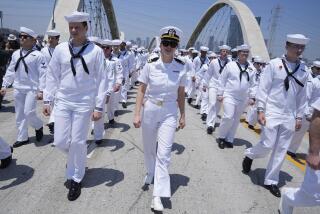Postscript : Tijuana Curfew: Smooth Sailing
- Share via
After a year of operation, the curfew forbidding the more than 125,000 San Diego-based military personnel from being in Tijuana between 8 p.m. and 5 a.m. is likely to remain in force indefinitely, Navy and Marine officials said Friday.
Tijuana, and the sailors and Marines who once frequented its nighttime haunts, seem to have adapted easily to the restriction, which caused considerable controversy on both sides of the border when it was enacted a year ago this month.
“There is no movement to change the curfew,” said Capt. Peter Litrenta, a spokesman for the Navy. “It’s been successful, and there have been no official requests from Tijuana to lift it, nor has there been a groundswell of requests from enlisted personnel to lift it.”
Arlene Villagram, head of press relations for the Baja California state tourism office in Tijuana, said the curfew has had “virtually no effect on the local economy.”
The curfew was enacted after the Navy received more than 30 reports of extortion attempts by Tijuana police against military personnel on liberty in the city. Most often, the reports involved threats by Tijuana police to arrest service personnel, often on false charges, unless immediate payments to the police were made. Navy officials, in setting the curfew, said some sailors were forced to pay $50 for minor traffic violations, while others reported being robbed at gunpoint by police. Almost all of the reported extortions occurred at night.
The Navy, in an official statement released when the curfew was adopted, said the move was necessary “because previous attempts to stop extortion of military personnel by the Tijuana police force members have proven fruitless.”
During its first two months of the curfew, there were more than 400 curfew violations reported by the Navy. Litrenta and Capt. Russ Thurman, a spokesman for the Marines at Camp Pendleton, said there have been relatively few violations since then, although they said exact figures for the last 10 months were unavailable. Litrenta said most violators have had their liberty privileges taken away.
Service personnel are allowed to visit Ensenada and other Mexican cities after dark, Litrenta said, and special provisions have been made for those living in Tijuana.
“We don’t patrol down in Tijuana,” Litrenta said. “But if someone comes back across the border during the curfew hours, their names are recorded and reported to their units. Then, the commanding officer investigates.
“The enlisted personnel have a good awareness of the curfew, and if they are coming back from Ensenada during the curfew hours, most often they report their plans in advance, so there are no questions.”
Thurman said local Marines “were inconvenienced initially, but are adaptable to things like this. The curfew is no longer a topic of discussion.”
Villagram said service personnel “still visit the city, and do their shopping and other activities. Then they either stay the night, so they won’t be in public during the curfew, head back earlier than they would have before, or go somewhere else down here at night. It really hasn’t been a big deal. And there are no plans to request that the curfew be lifted; if Tijuana was at some point unsafe for the military people, we felt it was in our best interests to go along with this. The problems before hurt our image among all Americans.”
More to Read
Sign up for Essential California
The most important California stories and recommendations in your inbox every morning.
You may occasionally receive promotional content from the Los Angeles Times.













